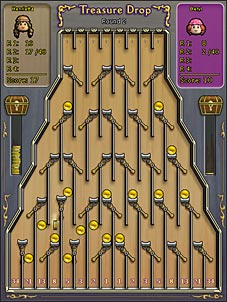Official:Treasure Drop
Treasure Drop
Contents
Pirates love treasure: getting it, hoarding it, spending it, and often playing with it. Treasure Drop is a two player game in which pirates try to outwit their opponent while dropping coins into a shared board with a series of switches. The goal of the game is to make drops which will cause coins fall out of the bottom of the board and into the point slots -- the greater the number of coins and the higher the point values, the better.
Controls
Each pirate takes turns dropping one coin at a time into the top of the board from an entry slot of her choice (the first pirate to make a drop is determined randomly, as is the initial layout of the switches). Entry slots are marked with arrows found along the top of the board. To make a drop, hover over the entry slot that you wish to drop a coin into and then press the mouse button. Note that each player has a limited time to make their move, which is shown by the hourglass. If the time runs out, a random drop will be made for you.
Falling Coins and Flipping Switches
A single coin will fall in its column until it either:
- hits an empty pad of a switch, where it will come to rest
- hits a coin resting on a switch pad, in which case it will bounce over that coin to the other side of that switch, or
- reaches a point slot at the bottom of the board, which will score that point value
Coins may combine to form multi-coins: double and triple. When two or more coins falling at the same horizontal level are merged into the same column (from the second action above), they will merge into a mult-coin. A multi-coin will contain the number of coins merged together and will spin while it falls. A multi-coin will fall in its column until it either:
- hits an empty pad of a switch, where one coin will come to rest while the other(s) will roll over to the other side of the switch
- hits a coin resting on a switch pad, in which case it will bounce over that coin to the other side of that switch
- reaches a point slot at the bottom of the board, which will score double or triple times that point value corresponding to number of coins in the multi-coins
Switches have two sides: the pad where a single coin can come to rest, and the lever that switches the switch (swinging the pad to the other side). The mechanics of switching are as follows:
- if a coin lands into the empty pad of a switch, the switch stays in the same position
- if a single coin passes through the lever side of the switch, the switch will switch (its pad will swing around to where the lever used to be)
- if a double coin passes through the lever side of the switch, the switch will switch twice rapidly (and end up in the same position)
- if a triple coin passes through the lever side of the switch, the switch will switch three times rapidly (will end up like a single switch)
- if a coin was resting on a pad of a switch that is switched, that coin is tossed into the air and will either:
- fall past the now lever side of the switch, switching the switch again (if a single or triple coin passed the lever)
- land back onto the pad of the switch (if a double coin passed the lever)
Rounds
The game is played in four rounds. It is important to note that the coins resting on switch pads will remain on the board between rounds. Each round consists of a point target that needs to be won during that round (regardless of the player's overall point total). The point targets for the rounds are as follows:
- 10 points for round 1
- 40 points for round 2
- 20 points for round 3
- 80 points for round 4
When a player reaches the point target in a round, the opponent gets one more drop to try to gain points. After the opponent's drop, the round is over and the next round begins (or the game ends if it was the last round). The coin meters will show each round's progress -- when the coins reach up to the chest the point target of the round has been reached.
Each round also has different point values for each of the point slots along the bottom. Rounds 2 and 4 have particularly higher point values towards the edges of the board. You will see the point values changing between rounds.
When round 4 ends, the player with the greatest point total wins the game. The coin meters will show the relative difference in overall score at the end of the game and the winner receives a chest full o' treasure to look at.
Treasure Dropping Strategy
Since you and your opponent take turns adding coins to the same board, it is important to realize that the strategy is to get your opponent to have to drop coins that will set up high scoring cascades of dropping coins for you. Try to drop into columns that will gain you points but not open up larger point scoring drops for your opponent. A lot of the times, the best move is one that doesn't give you any points, but leaves your opponent with either nothing as well, or ideally forces her to make a drop that opens up a large scoring opportunity for you. Also, try to set it up where you can cash in on large scoring drops during rounds 2 and 4, where the point slots are worth much more, especially out towards the edges.




